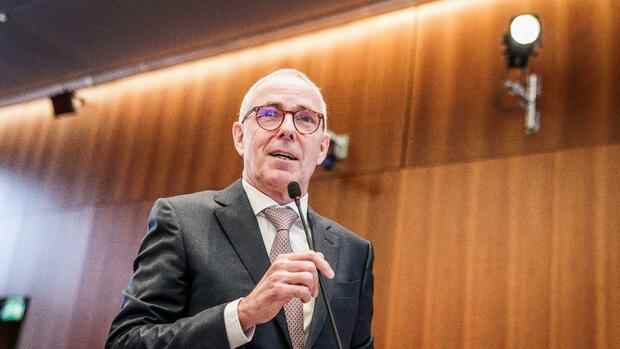The DIHK President calls for further relief for companies.
(Photo: dpa)
Berlin Delivery bottlenecks, high energy prices and economic sanctions against Russia – four out of five German companies are directly affected by the Ukraine war and its consequences. Many companies are hit hard after two years of Corona.
“The current situation of many companies is far more difficult than some public discussions or model calculations suggest,” says Peter Adrian, President of the German Association of Chambers of Industry and Commerce.
Currently, losses from 2022 can only be carried back to the years in which the companies were already burdened by Corona. Specifically, the Association of German Chambers of Industry and Commerce therefore calls for the following to be taken into account: Losses from the crises should be offset in full, the loss carryback extended to five years and the losses suffered in the crises offset against future profits.
In February, the federal government passed the Fourth Corona Tax Assistance Act. According to the parliamentary FDP Finance Secretary Katja Hessel, the law shows “that we are not leaving people and companies to deal with the consequences of Corona alone.”
Top jobs of the day
Find the best jobs now and
be notified by email.
The economic consequences of the Ukraine war were not yet foreseeable at that time. That is why the German Chamber of Industry and Commerce is now calling for a sharpening.
“Historically unprecedented phase of loss and crisis”
A survey by the DIHK from November 2020 also shows how tense the economic situation of companies has been for a long time. The number of companies reporting losses had already doubled to 40 percent in the first year of Corona. 26 percent of entrepreneurs even complained that their business activities had come to a standstill during the pandemic.
According to Adrian, German companies are more affected by delivery bottlenecks than in many other countries. As a result, corporate profits also fell by ten percent in 2020. Although these rose again in 2021, many companies are likely to suffer losses again this year as a direct or immediate result of the war. The DIHK President believes that companies can survive the “historically unprecedented phase of losses and crises”, but only “if the state now shifts burdens or suspends them entirely.”
Criticism of Olaf Scholz and Christian Lindner
The CDU financial politician Olav Gutting welcomes the DIHK’s call for the expansion of loss offsetting: “We have been calling for this for several months. But we were ignored first by Finance Minister Olaf Scholz and then by Christian Lindner.” In order to extend the accounting period to five years, companies would have to temporarily suspend the minimum tax on profits.
Peter Adrian believes that this would be an effective help for the companies: “You could bridge the crisis with the money you have earned yourself and pay a lot of taxes later.” However, only losses from the annual results under commercial law should be offset from 2020. This is to ensure that the losses are as a result of the corona pandemic or the Ukraine war.
However, Olav Gutting considers the DIHK’s demand for the losses to be offset in full to be excessive. “We had proposed offsetting up to EUR 15 million and EUR 30 million in the case of joint assessment. That covers medium-sized companies.” The legal regulations must remain within the scope of what the tax authorities can afford.
There is no money for investments
According to Peter Adrian, many companies are threatened with tax payments under the current legislation, even though they have not yet made up for their losses from previous crisis years. The DIHK President says: “This money is particularly lacking for investments.” Katja Hessel said when the draft law was presented in February that the law “set the course for relief and better framework conditions for future investments”.
However, it is also no secret that the FDP “would have wished for more in the coalition negotiations in the area of corporate taxes”. However, that was not possible with the partners, which is why the provision of liquidity for the companies would remain on their agenda.
The DIHK would like to implement the change in loss offsetting during the ongoing legislative process for the Fourth Corona Tax Assistance Act.
More: Eleven billion euro relief: Lindner is launching several tax breaks
